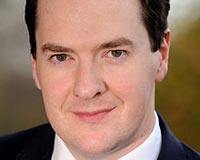 The Iron chancellor was more like a magician pulling rabbits from a hat as he announced surprise funding boosts, from housebuilding to pensions and infrastructure, during the comprehensive spending review.
The Iron chancellor was more like a magician pulling rabbits from a hat as he announced surprise funding boosts, from housebuilding to pensions and infrastructure, during the comprehensive spending review.
George Osborne U-turned on previously mooted cuts announced in the summer Budget after a favourable forecast from the Office for Budget Responsibility revealed an unexpected £53.2bn jump in expected tax receipts over this Parliament.
While budget ring-fencing for the police service and tax credits in welfare were the headline savings, the property industry also had reason to celebrate with the government committing to nearly £7bn towards a housebuilding recovery.
This was supported by a 50% increase in capital investment for the Department for Transport for infrastructure projects such as HS2 and Crossrail, which will open up new areas for prime residential development.
But after a flurry of instant reactions, policy directors across the industry will be sitting down to examine what the numbers really mean and how much of the extra funding or housing targets are actually additional to previous announcements.
Jeremy Blackburn, head of policy at the Royal Insititute of Chartered Surveyors, says most people were “quite surprised” with the levels of investment announced by the “axe man” chancellor.
But he said operational cuts to government departments including the Department for Transport (37%), the Department for Communities and Local Government (30%) and DEFRA (15%), could threaten the delivery of the housebuilding drive.
The RICS had called for investment in housing across all tenures to address the housing crisis, and Blackburn says he was “disappointed” by the clear weight towards home ownership in the spending review.
A stamp duty hike of 3% for buy-to-let or second homes will stifle the provision of much-needed homes for rent, Blackburn says. “We might not always need them, but we do now”, he adds.
Stamp duty on a property costing £250,000 will quadruple from £2,500 to £10,000, according to analysis by Deloitte. However, institutionally backed investors will be exempt from the tax rise.
Richard Lambert, chief executive of the National Landlords Association, says his members are “horrified” by the chancellor’s announcement.
“I don’t think he has thought through what the consequences are going to be on the PRS provision going forward which has been driven by the smaller private landlords.”
Steve Sanham, development director at HUB Residential, believes the mid-level housing market targeted by HUB developments will “cool down” as demand from smaller private landlords drops.
But he says it could be a boost to the institutional PRS sector, in which HUB has also invested.
“A lot of people saw this as a purchaser’s budget rather than a renter’s budget but I think what that stamp duty change does is allows more weight behind the PRS movement.”
To achieve its ambitious target of 400,000 homes built by 2020, the government has set in motion significant planning reforms in a bid to accelerate housebuilding.
All local authorities will be required to create local plans with housing targets and a new delivery test will aim to guarantee that targets are met.
Ghislaine Halpenny, communications director and former assistant director of planning and development at the British Property Federation, says local authorities will only be able to deliver local plans if two changes are made.
First, local plans need to be smaller, simpler and more focused, she says.
Second, local authorities must be properly resourced and part of that involves a culture change.
Successful authorities, she says, will need to recognise that planning authorities are their “engines of growth”.
Halpenny also welcomes the move towards standardised viability assessments for councils and developers, which she believes will speed up the planning process.
The policies go hand-in-hand with the Conservative government’s devolution agenda, giving councils and city regions increased powers to drive growth in their areas.
Alexandra Jones, chief executive of Centre for Cities, welcomes the decision to give councils control over business rates generated in their area, with the ability to raise 2% council tax precepts and retain 100% of receipts from local asset sales.
But she says devolution needs to go further if the regions are able to secure much-needed investment from the private sector.
“It is also crucial that as devolution progresses and these investment plans are put in place, more decisions about housing, skills, enterprise and transport are taken at city-region level”, she says.










